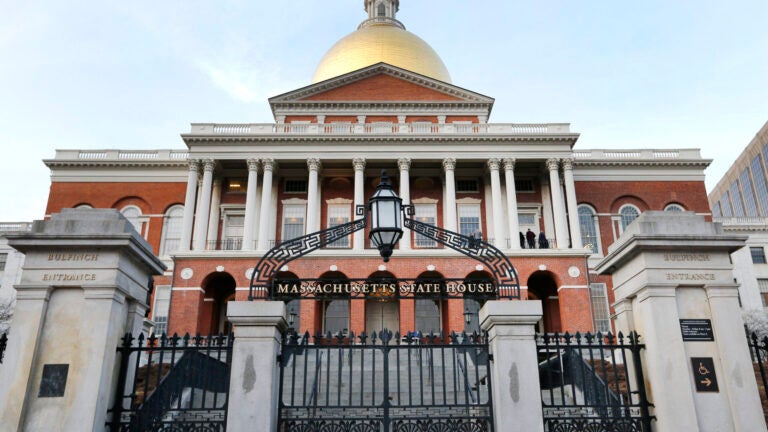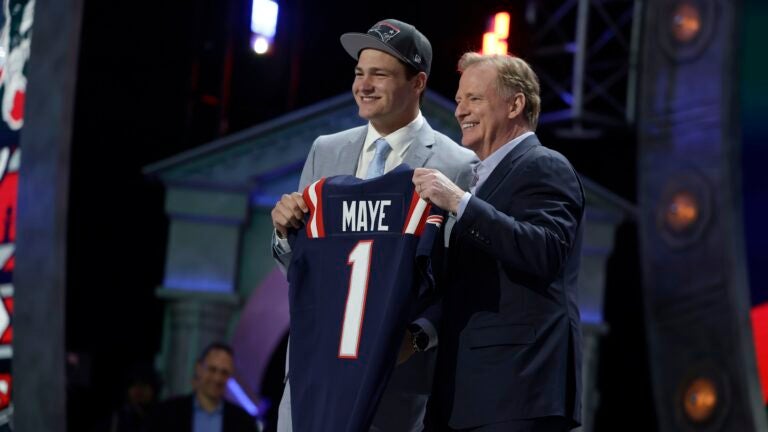Massachusetts is close to establishing a permanent commission on the status of Black men and boys
“Black men and boys have the biggest disparities when it comes to every issue area.”

Related Links
-
Beacon Hill
Black State House staffers lay out reforms for addressing racism, diversity problems in capitol’s offices
-
RACISM & PUBLIC HEALTH
Here’s why declaring racism a public health crisis is ‘encouraging,’ but just a start, according to Harvard public health dean
-
Racial Justice
The Mass. House passed a police reform bill. But the ACLU says it ‘misses the mark.’
As negotiations continue on Beacon Hill over the final version of a police accountability and reform bill, community activists have their eye on another measure attached to the approved House legislation — the establishment of a permanent commission on the status of Black men and boys.
The amendment to form the permanent commission, championed by Rep. Chynah Tyler of Boston, was approved by the House on July 22.
Proud to establish a commission on Black men and Black Boys as they have the most alarming disparities across all issues areas! #H.4860 #Mapoli
— Chynah Tyler (@RepChynahTyler) July 22, 2020
“I think we’re going in the right direction,” Tyler told Boston.com in an interview after the amendment was adopted.
The permanent commission would comprise 21 appointees who would “work to improve economic, education, criminal justice, public safety, housing, health and wellness, father-hood, and mentorship outcomes of Black men and boys in the Commonwealth of Massachusetts.”
The commission would “study and examine issues which disproportionately have a negative impact on Black men and boys in Massachusetts, will signal that the issues facing the Black male population are a national priority, will develop solutions to these hardships, and will help eliminate the obstacles facing Black men and boys,” the adopted amendment reads.
In the weeks after George Floyd was killed in Minneapolis, with the renewed focus on systemic racism and police violence against Black people in the United States, members of Congress introduced a bill to establish a federal Commission on the social status of Black men and boys. Massachusetts Democrat Rep. Ayanna Pressley is among those advocating for the proposal, which was sponsored by Florida Congresswoman Frederica Wilson.
Thank you, @RepPressley, for your moving words in support of the #BlackMenAndBoysAct, “that will push our nation one step closer to grappling with the systemic racism and structural barriers that have robbed us of…our black husbands, our black brothers, and our black sons.” pic.twitter.com/ixHO6L2alk
— Rep. Frederica Wilson (@RepWilson) July 27, 2020
Tyler, who introduced the Massachusetts proposal in 2019, said having the commission be permanent and codified in state law is “important” and “vital.”
“Because across all issue areas — housing, public safety, public health, the marijuana industry, you name it — Black men and boys have the biggest disparities when it comes to every issue area,” she said. “And oftentimes when we create legislation, when we create policy or any ordinances around those issue areas, a lot of the times, the mark is missed. [It’s] not focused on how it greatly affects Black men and boys, who again, have the most alarming disparities.
“So the purpose of this commission,” she said, “is to be able to help put together an organized group to be able to better advise policy, so that moving forward, we’re able to address those policies and do away with the disparities that Black men and boys face in the Commonwealth of Massachusetts.”
Under the mandate of improving the social status of Black men and boys, the commission would inform state and industry leaders and would also identify and recommend policies or programs that could be implemented by state agencies to improve outcomes for Black men and boys.
The effort is years in the making and builds on previous efforts to establish similar commissions, both at the state and local level. In 2008, leaders in the Black community, including renowned Harvard law professor Charles J. Ogletree Jr., urged state legislators to create a 21-person permanent commission. In 2014, former Boston City Councilor Tito Jackson spearheaded an effort to establish a panel in Boston, which was ultimately vetoed by Mayor Marty Walsh, who said it duplicated already ongoing efforts and would technically violate the city charter.
I want thank @RepChynahTyler for her leadership in sponsoring and passing legislation creating a Commision on The Status of Black Men & Boys in the State of MA. This issue is near and dear to my heart because I proposed this in 2014. Now #DreamsComeTrue! #props #bospoli #mapoli
— Tito Jackson (@titojackson) July 23, 2020
James Mackey, a program lead for Brothers Building, an initiative run out of Codman Square Neighborhood Development Corp. that focuses on holistic wellness for Black men through collaboration with direct service entities and leaders in the community, told Boston.com he supports establishing the permanent commission. The state-level group is needed to hold not only legislators accountable for the laws, practices, and procedures that impact Black lives, in particular men and boys, but also the gatekeepers of funding and opportunities in the Commonwealth, he said.
“If the governor and the legislators truly believe in Black lives, then they would do the right thing and support this permanent commission for Black men and boys,” he said. “Because we’ve been taken advantage of, been deprived of our own history, of our own rights, of our existence in this country. And we would like to have the allocations and access to resources and opportunities, but we’ve been deprived just because of the color of our skin.”
Based on his personal experience, both directly with racism and bias as well as witnessing the way social systems and institutional racism have adversely impacted the health and wellness of others, Mackey said he believes having the commission set up by the state is essential to bringing greater accountability and change.
“It will get organizations — institutions that have been racist or against Black lives or against Black men and boys — to start challenging the way that they operate, the way that they are dealing with Black men and boys,” he said. “The state will be able to hold those institutions accountable, and there will be research that will back that up. Even though, to be truthful, there doesn’t need to be any research. There’s been enough research that has been done.”
If, for some reason, the measure does not move forward, Mackey said he suspects the community will establish its own commission to elevate and raise awareness on the issues that affect Black men and boys.
The work can’t wait and requires people to get engaged at the local, state, and federal level, he told Boston.com before the amendment was approved.
“I don’t want my son or my daughter or anyone who looks like me to continue to have to consistently deal with laws, policies, and practices on a city, state, and federal level that continue to perpetuate and racially profile and impact Black lives negatively,” he said.
For her part, Tyler said she’s hopeful that the commission will get up and running sometime in August, upon approval of the final version of the police reform bill.
“I’m feeling really happy and overall accomplished because what we’re trying to do is very complex and it takes several steps to be able to get to where we were,” Tyler said of the movement on the proposal. “So any small accomplishment along the way just signals to me that we’re going in the right direction.”
After the amendment was adopted, Mackey celebrated its passage with a message on Facebook and thanked those who pushed and supported the measure. But, he emphasized, it is a “small victory.”
“We must not let our feet off the gas as we continue to fight against racial injustices that we face across this Commonwealth and beyond,” he wrote on Facebook.
Get Boston.com's browser alerts:
Enable breaking news notifications straight to your internet browser.






